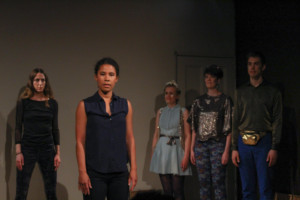Review: FALL PRETTIER, The Space

![]()
There are many different accounts of Medea's tale, all told by men or in relation to their presence in her life. Therese Ramstedt and Zandile Darko reclaim her narrative and aim the spotlight to the actual pivots of the myth, Glauce and Medea themselves, giving them the chance to tell their version of it.
They deliver a compelling piece that fuses comedy with the dark and primal story, drawing a jarring comparison between the modern world and its mythical counterpart.
The dichotomy of the material is the foundation of its strength. Aided by Helga Ragnars, Knut Olav Rygnestad, and Laura Schuller they toy with the tone: a talk show called "Wicked Women" turns the tragedy into a laughingstock.
They pit the two against each other, hardly asking for their own sides of the incident while Darko's Medea becomes an unmovable entity who urges the crowd to understand her beyond the fourth wall - all while taunted by the chorus of a disturbingly catchy jingle that pins her down as a "killer of babies".
The company installs a structure around the intimacy of the main characters. They have to deal with outside forces that alternate between forcing them to assume their role as female subjects and being turned into the targets for the unrequired opinions of strangers.
The audience is vigorously encouraged by Ragnars to clap for the scarring events shown on stage: she holds up an "Applause" sign with a huge smile on her face, prompting them to put their hands together in approval.
They are requested to applaud when Schuller entices the nonexistent catfight, when Jason murders his second wife, and after more horrendous acts are retold. The audience curiously complies in dismay, and Medea and Glauce become puppets controlled by the hands of men.
But Glauce and Medea meet in neutrality, they go to therapy, struggle with accepting the roles they were assigned at birth, and are, in essence, very human while quietly dismantling the image that was created of them.
Through delicate a cappella songs, physical comedy, and lots and lots of glitter, Fall Prettier shows how essential it is to look beyond the picture that's being forcefully fed to the public and get to the centre of the issue. It breaks down stereotypes and shatters the preconceived notions that confine Medea to being a murderous mother and Glauce to the trope of the "other woman'.
Running at just under one hour, the show still finds plenty of breath to grow and develop. Its episodic nature and tongue-in-cheek attitude work well with the tonal divergence between storytelling and material that's at its core. This latter element turns the play into a substantial oxymoron, offering food for thought on each level of interpretation and asking questions that, unfortunately, don't have easy answers.
Fall Prettier runs at The Space until 30 June.
Photo credit: Liv Barath
Reader Reviews

Videos

